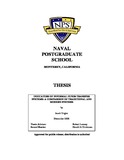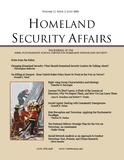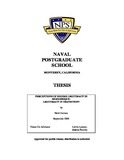Indicators of informal funds transfer systems a comparison of traditional and modern systems
| dc.contributor.advisor | Looney, Robert | |
| dc.contributor.author | Trigler, Jacob. | |
| dc.date.accessioned | 2012-03-14T17:39:14Z | |
| dc.date.available | 2012-03-14T17:39:14Z | |
| dc.date.issued | 2008-12 | |
| dc.identifier.uri | https://hdl.handle.net/10945/3732 | |
| dc.description.abstract | Informal funds transfer systems (IFTS) are prevalent throughout the world and are used for various legitimate and illegitimate purposes. There are many variations of these systems that can be generally classified as traditional or modern systems. Traditional and modern IFTS share many of the same characteristics, but that is the extent of the similarities between these two groups. Traditional systems were developed to meet the legitimate needs of businesses and individuals and at times became the formal banking system within the Middle East and South Asia. Conversely, modern IFTS were developed purely as criminal systems and have no legitimate purpose. Whereas traditional systems have predominantly positive effects on the communities in which they operate, modern systems are the exact opposite and have predominantly negative effects. The purpose of this thesis is to analyze the use of traditional and modern IFTS in order to identify the specific macro indicators and conditions responsible for their development and continued use. Identifying these indicators will allow regional, national and international agencies and organizations to detect the emergence or presence of IFTS and focus their efforts to develop effective regulatory policies to limit the illegitimate use while maintaining the legitimate aspects of these systems. | en_US |
| dc.description.uri | http://archive.org/details/indicatorsofinfo109453732 | |
| dc.format.extent | xii, 85 p. : ill. ; | en_US |
| dc.publisher | Monterey California. Naval Postgraduate School | en_US |
| dc.subject.lcsh | National security | en_US |
| dc.subject.lcsh | Corruption | en_US |
| dc.subject.lcsh | Criminology | en_US |
| dc.subject.lcsh | Banks and banking | en_US |
| dc.title | Indicators of informal funds transfer systems a comparison of traditional and modern systems | en_US |
| dc.type | Thesis | en_US |
| dc.contributor.secondreader | Trinkunas, Harold A. | |
| dc.contributor.corporate | Naval Postgraduate School (U.S.) | |
| dc.description.service | US Air Force (USAF) author. | en_US |
| dc.identifier.oclc | 309280689 | |
| etd.thesisdegree.name | M.A. | en_US |
| etd.thesisdegree.level | Masters | en_US |
| etd.thesisdegree.discipline | Security Studies | en_US |
| etd.thesisdegree.grantor | Naval Postgraduate School | en_US |
| etd.verified | no | en_US |
| dc.description.distributionstatement | Approved for public release; distribution is unlimited. |
Files in this item
This item appears in the following Collection(s)
-
1. Thesis and Dissertation Collection, all items
Publicly releasable NPS Theses, Dissertations, MBA Professional Reports, Joint Applied Projects, Systems Engineering Project Reports and other NPS degree-earning written works.





